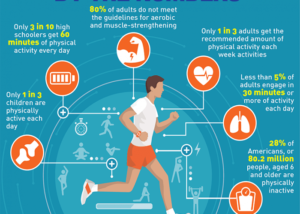Sports for Health: A Holistic Approach to Well-Being
Introduction
Engaging in sports is not just a source of entertainment and physical activity; it is a gateway to a healthier, more fulfilling life. The benefits of sports for health are far-reaching, encompassing physical fitness, mental well-being, and social connection. In this comprehensive article, we will explore the world of sports for health, covering the holistic advantages, the best sports to pursue, and the importance of balance in sports and life.
The Holistic Benefits of Sports for Health
Sports offer a multifaceted approach to health, promoting well-being on various levels. From improving physical fitness and mental health to fostering social connections, sports have the power to transform lives and create a harmonious balance.
The Physical Benefits of Sports for Health
Physical fitness is the foundation of health, and sports provide an enjoyable and effective means of achieving and maintaining it. Here are some of the physical benefits of engaging in sports:
1. Cardiovascular Health
Sports that involve aerobic activities, such as running, swimming, and cycling, boost cardiovascular health by strengthening the heart, improving circulation, and reducing the risk of heart disease.
The Heart-Healthy Benefits of Aerobic Sports
Engaging in aerobic sports enhances the cardiovascular system, improving heart health and circulation. These activities reduce the risk of heart disease and promote longevity.
2. Muscular Strength and Endurance
Sports like weightlifting, CrossFit, and martial arts promote muscular strength and endurance. Building strong muscles and joints not only enhances physical performance but also prevents injuries.
Building Muscular Strength through Sports
Sports that focus on resistance training, like weightlifting, help develop muscular strength and endurance. Strong muscles and joints are essential for overall physical fitness.
3. Flexibility and Balance
Sports such as yoga and martial arts emphasize flexibility and balance. These activities promote joint health, prevent injury, and improve overall mobility.
Enhancing Flexibility and Balance through Yoga and Martial Arts
Yoga and martial arts are ideal for enhancing flexibility and balance. These practices benefit joint health, reduce the risk of injury, and improve overall mobility.
4. Weight Management
Many sports and physical activities, including tennis, basketball, and hiking, help with weight management by burning calories and promoting a healthy body weight.
Sports and Weight Management
Participating in sports and physical activities is a natural way to manage weight. These activities help burn calories and maintain a healthy body weight.
The Mental Health Benefits of Sports for Health
Mental health is as crucial as physical health, and sports offer an array of benefits that support mental well-being:
1. Stress Reduction
Engaging in sports and physical activities reduces stress by promoting the release of endorphins, which act as natural mood lifters and stress relievers.
Stress Reduction through Sports
Sports and physical activities trigger the release of endorphins, reducing stress and enhancing overall mental well-being.
2. Improved Mood
Sports have a positive impact on mood by increasing the production of serotonin, a neurotransmitter associated with feelings of happiness and well-being.
Enhancing Mood through Sports
Sports promote the release of serotonin, which leads to an improved mood and increased feelings of happiness.
3. Mental Resilience
Sports help build mental resilience by fostering qualities such as determination, perseverance, and the ability to cope with challenges.
Building Mental Resilience through Sports
Participating in sports cultivates mental resilience, including qualities like determination and the ability to overcome challenges.
4. Enhanced Cognitive Function
Sports and physical activities improve cognitive function by increasing blood flow to the brain, which enhances memory, concentration, and problem-solving abilities.
Cognitive Benefits of Sports
Engaging in sports and physical activities boosts cognitive function by increasing blood flow to the brain. This leads to enhanced memory, concentration, and problem-solving abilities.
The Social Benefits of Sports for Health
Social connections play a pivotal role in overall well-being, and sports offer unique opportunities for building and nurturing these connections:
1. Teamwork
Team sports, such as football, basketball, and soccer, foster a sense of camaraderie and teamwork. These activities teach individuals to work together and support one another.
Fostering Teamwork through Sports
Team sports are renowned for fostering teamwork, camaraderie, and cooperation among participants. These experiences strengthen social bonds.
2. Community Engagement
Participating in local sports leagues and events allows individuals to connect with their community, meet new people, and become active members of their society.
Connecting with the Community through Sports
Engaging in local sports events and leagues promotes community engagement, offering opportunities to connect with others and contribute to the local society.
3. Friendship and Social Circles
Sports create opportunities for building friendships and expanding social circles. Participating in group activities can lead to lasting, meaningful relationships.
Expanding Social Circles through Sports
Sports provide a platform for forming friendships and expanding social circles. Participation in group activities often leads to meaningful, lasting relationships.
Finding Balance in Sports and Life
While sports offer numerous physical, mental, and social benefits, it is essential to find a balance that promotes overall well-being. Here are some key considerations for achieving that balance:
1. Variety
Explore a variety of sports and physical activities to prevent burnout and boredom. Variety keeps physical and mental engagement high.
H2: The Importance of Variety in Sports
Variety is crucial for preventing burnout and maintaining motivation in sports. Trying different activities keeps both the body and mind engaged.
2. Rest and Recovery
Prioritize rest and recovery to prevent overuse injuries and mental fatigue. Adequate sleep, nutrition, and relaxation are essential for maintaining balance.
H2: Prioritizing Rest and Recovery in Sports
Rest and recovery are vital for preventing overuse injuries and mental fatigue. Prioritizing sleep, nutrition, and relaxation helps maintain balance in sports and life.
3. Setting Realistic Goals
Set achievable goals that align with your abilities and interests. Unrealistic expectations can lead to frustration and imbalance.
H2: Achieving Balance through Realistic Goals
Setting achievable goals that align with your abilities and interests is key to maintaining balance. Unrealistic expectations can lead to frustration and imbalance.
4. Time Management
Balance your sports and physical activities with other life responsibilities. Effective time management ensures that sports enhance, rather than hinder, your overall well-being.
H2: Balancing Sports with Time Management
Effective time management ensures that sports enhance overall well-being without interfering with other life responsibilities.
Conclusion
Sports for health offer a holistic approach to well-being, encompassing physical fitness, mental health, and social connections. The benefits of sports extend far beyond physical activity, touching every aspect of our lives. By recognizing and embracing the holistic advantages of sports, and by finding balance within our sporting pursuits, we can lead healthier, happier, and more fulfilling lives. Sports provide a path to well-being that is within reach for everyone, regardless of age, ability, or experience.



